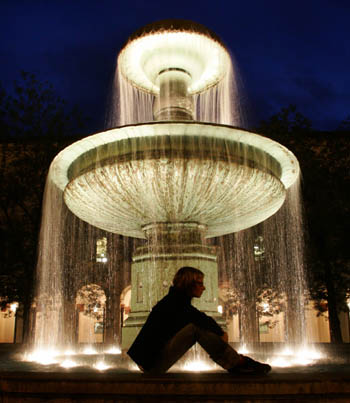Warnings of a potential terrorist threat to soccer's World Cup hold chilling
associations for the city of Munich as it prepares to host the opening match
under the gaze of billions of TV viewers.
The German players who will take the field against Costa Rica on Friday are
too young to remember the massacre of 11 Israeli athletes by Palestinian "Black
September" guerrillas at the 1972 Olympic Games in Munich.

A woman rest in front
of an illuminated fountain in Munich's centre near an university on May
27, 2006. The FIFA soccer World Cup 2006 will be held in Germany from June
9 - July 9.[Reuters] |
But the experience of
seeing the "Friendly Games" turn into a bloodbath left deep scars on Germany,
provoked a radical security shake-up whose results are still visible, and
remains very much in the minds of police and officials.
"I believe it's an abiding memory and a warning for Germany," says Gregor
Rosenthal, a senior interior ministry official helping to lead the copious
security planning for the 32-nation World Cup.
Officials say there is no concrete indication that Islamist militants are
planning attacks during the tournament, although the general "abstract risk" is
high.
They say the opening match in Munich and the July 9 final in Berlin would
present the most symbolic, and therefore most attractive, targets.
The massive security net includes NATO air patrols, flight bans over
stadiums, 250,000 police on duty around the country and a comprehensive
intelligence-sharing network with a round-the-clock unit in Berlin at its nerve
centre.
Special forces at the ready include the crack 240-strong GSG 9, created
specifically in response to the Munich tragedy.
LESSONS LEARNED
In many ways, Munich 1972 was an object lesson in how not to handle a
militant attack.
A series of blunders culminated in a bloody debacle at Fuerstenfeldbruck, an
airbase where the Germans had provided the Palestinians with a getaway plane but
planned to overpower them and free their Israeli hostages.
"We had never seen a terrorist, it was like something out of a bad TV cop
film...We hadn't trained for that," recalls Heinz Hohensinn, 63, a Munich
policeman who was part of the assault team but whose previous experience was
limited to tackling robbers and drug dealers.
"The fully fuelled plane was standing there ready to take off, as the
terrorists demanded," he told Reuters.
"We were supposed to overwhelm the terrorists in the aircraft before it took
off, but that was a short-term emergency plan and it was abandoned as too risky
because the leader had a hand grenade and we would all have been blown up with
the plane. Then the shooting started..."
All the hostages were killed in the carnage, along with a German policeman
and five of the kidnappers.
Security analyst Rolf Tophoven said Germany's desire to present a friendly
face to the world at Munich -- in contrast to the Nazi-hosted Olympics in Berlin
36 years earlier -- was partly to blame for the lack of preparedness.
"The trauma of the Hitler Olympiad was in the minds of the German
organisers...Security was low-profile in Munich because no one wanted to stir
memories of German police and armed troops in 1936," he said.
Another generation on, and with the U.S.-led war on terrorism nearly five
years old, German security is forewarned, better equipped and confident it can
throw a great sporting party for the world.
"The training, weapons and technical equipment are all very different
today...There's a lot more understanding of security and controls. The
hospitality won't be dampened if the security is cranked up," Hohensinn said.
Officials believe they can show off their country as a fun-loving, welcoming
host and keep the tournament safe without smothering it with security.
"We have our tournament motto -- "A Time to Make Friends" -- and that means
above all that sportsmen and fans from all over the world will feel safe,"
Interior Minister Wolfgang Schaeuble said this week. "We need security for a
joyful and happy World Cup."